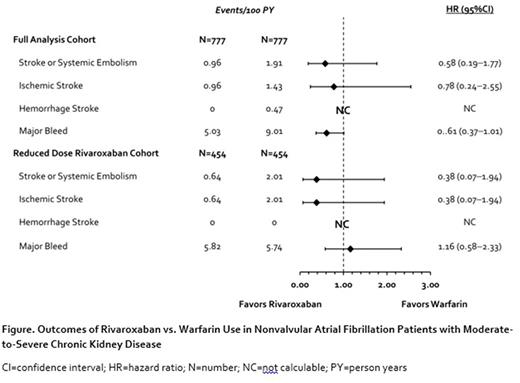Abstract
Background: Chronic kidney disease (CKD) is a potent risk factor for both ischemic stroke and major bleeding in patients with nonvalular atrial fibrillation (NVAF).
Objective: To assess the effectiveness and safety of rivaroxaban vs. warfarin in NVAF patients with moderate-to-severe CKD treated in routine practice.
Methods: Using US MarketScan claims data from 11/2011-3/2016, we identified oral anticoagulation (OAC) naïve NVAF patients with moderate-to-severe CKD and ≥12 months of continuous insurance coverage prior to the qualifying OAC dispensing. Rivaroxaban users (20 mg or 15 mg once daily) were 1:1 matched to warfarin users by applying propensity-scores that were calculated based on demographics, comorbidities, stroke and bleeding risk factors and concomitant medications. Balance between cohorts was evaluated by inspecting standardized differences for baseline covariates (differences >0.1 indicating imbalance). Patients were followed until an event, OAC discontinuation/switch (30 day permissible gap), insurance disenrollment or end of follow up. Rates of stroke/systemic embolism (SSE) and major bleeding (per the Cunningham algorithm) between cohorts were compared using Cox regression. A separate propensity-score matched analysis of reduced dose rivaroxaban vs. warfarin users was performed.
Results: We assessed 777 rivaroxaban and 777 warfarin users with NVAF and moderate-to-severe CKD with a median (interquartile range) available follow up of 1.3 (0.6-2.2) years. All baseline covariates evaluated had a standardized difference <0.1. Median age was 76 (68-82) years and median CHA2DS2-VASc and HAS-BLED scores were 4 (3-5) and 3 (3-4). Rivaroxaban use was associated with nonsignificant relative hazard reductions in SSE and ischemic stroke vs. warfarin (Figure). No differences in major bleeding or hemorrhagic stroke were observed between cohorts. The reduced dose 15 mg rivaroxaban vs. warfarin user analysis yielded similar conclusions to the full cohort analysis.
Conclusions: Results of this claims database analysis are generally consistent with those seen in the randomized ROCKET AF trial. Rivaroxaban's relative effectiveness and safety vs. warfarin appears to be maintained in NVAF patients with moderate-to-severe CKD treated in routine clinical practice.
Coleman: Boehringer Ingelheim: Consultancy, Honoraria; Bayer AG: Consultancy, Honoraria, Research Funding; Janssen Pharmaceuticals: Consultancy, Honoraria, Research Funding. Turpie: Bayer HealthCare Pharmaceuticals: Consultancy; Janssen Research and Development: Consultancy, Honoraria. Kreutz: Bristol-Myers Squibb: Honoraria; Daiichi Sankyo: Consultancy, Honoraria; Berlin-Chemie Menarini: Consultancy; Bayer AG: Consultancy, Honoraria; Lundbeck: Consultancy; Servier Laboratories: Consultancy.
Author notes
Asterisk with author names denotes non-ASH members.


This feature is available to Subscribers Only
Sign In or Create an Account Close Modal